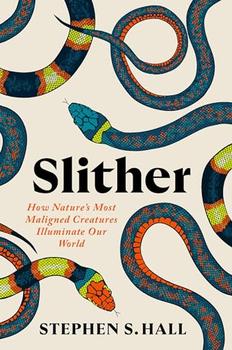
How Nature's Most Maligned Creatures Illuminate Our World
by Stephen S. Hall
A spellbinding scientific and cultural study of snakes, the fascination and fear they inspire, and how surprising new science is indelibly changing our perception of these stunning and frightening creatures.
For millennia, depictions of snakes as alternatively beautiful and menacing creatures have appeared in religious texts, mythology, poetry, and beyond. From the foundational deities of ancient Egypt to the reactions of squeamish schoolchildren today, it is a historically commonplace belief that snakes are devious, dangerous, and even evil. But where there is hatred and fear, there is also fascination and reverence. How is it that creatures so despised and sinister, so foreign of movement and ostensibly devoid of sociality and emotion, have fired the imaginations of poets, prophets, and painters across time and cultures?
In Slither, science writer Stephen S. Hall presents a naturalistic, cultural, ecological, and scientific meditation on these loathed yet magnetic creatures. In each chapter, he explores a biological aspect of The Snake, such as their cold blooded metabolism and venomous nature, alongside their mythology, artistic depictions, and cultural veneration. In doing so, he explores not only what neurologically triggers our wary fascination with these limbless creatures, but also how the current generation of snake scientists is using cutting-edge technologies to discover new truths about these evolutionarily ancient creatures—truths that may ultimately affect and enhance human health.
"Hall suggests snakes became Christian symbols of evil in part because of the religion's efforts to vilify followers of the Greek god Asklepios, who was said to have learned his healing techniques from snakes. The result is a revelatory take on the much feared reptiles." —Publishers Weekly (starred review)
"Readers are likely to come away from this book with a healthy respect for our scaly neighbors, as well as for those who study them. An eye-opening look at the world of snakes by an eloquent admirer of the creatures." —Kirkus Reviews
This information about Slither was first featured
in "The BookBrowse Review" - BookBrowse's membership magazine, and in our weekly "Publishing This Week" newsletter. Publication information is for the USA, and (unless stated otherwise) represents the first print edition. The reviews are necessarily limited to those that were available to us ahead of publication. If you are the publisher or author and feel that they do not properly reflect the range of media opinion now available, send us a message with the mainstream reviews that you would like to see added.
Any "Author Information" displayed below reflects the author's biography at the time this particular book was published.
Stephen S. Hall has been reporting and writing about the intersection of science and society for more than 40 years. In addition to numerous cover stories in the New York Times Magazine, where he also served as a Story Editor and Contributing Writer, his work has appeared in The New Yorker, The Atlantic Monthly, National Geographic, New York Magazine, Wired, Science, Nature, Scientific American, Discover, The Sciences, Hip-pocrates, Smithsonian, and more. He is also the author of six critically acclaimed non-fiction books about contemporary science. Among other honors, he has received the Walter Sullivan Award for Excellence in Science Journalism from the American Geophysical Union (2011); the Best Magazine Story of the Year from the American Association for the Advancement of Science-Kavli Foundation in 2017; and an honorary doctorate from Cold Spring Harbor Laboratory in 2023. He also received a Guggenheim Fellowship in 2012.
Since 2007 Hall has served as an adjunct professor of journalism at New York University, where he taught a core-curriculum graduate-school seminar in science writing at NYU's Science, Health, and Environmental Reporting Program (SHERP) for ten years. He previously taught graduate seminars in science writing and explanatory journalism at Columbia University. Since 2009, he has also conducted hundreds of Science Communication Workshop sessions for scientists and doctors at NYU, Rockefeller University, Mt. Sinai School of Medicine, and Cold Spring Harbor Laboratory.
We must believe in luck. For how else can we explain the success of those we don't like?
Click Here to find out who said this, as well as discovering other famous literary quotes!
Your guide toexceptional books
BookBrowse seeks out and recommends the best in contemporary fiction and nonfiction—books that not only engage and entertain but also deepen our understanding of ourselves and the world around us.